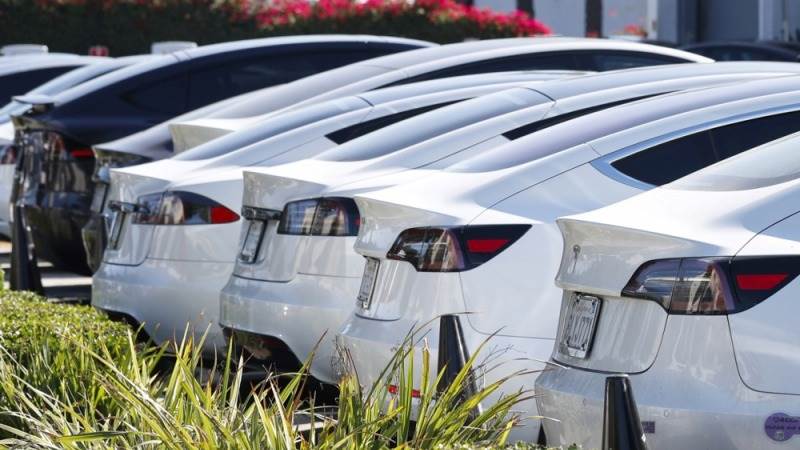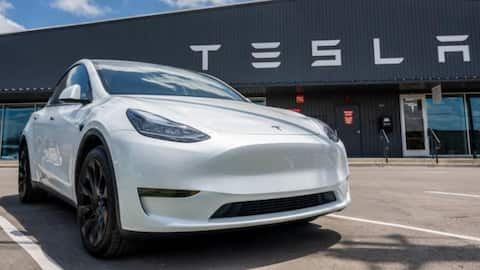India Deliberates Tesla’s Bold Bid to Slash Tariffs on Imported EVs Amidst Geopolitical Tensions

India Deliberates Tesla’s Bold Bid to Slash Tariffs on Imported EVs Amidst Geopolitical Tensions
In a significant development, the Indian government is currently contemplating a request from Elon Musk‘s electric vehicle (EV) giant, Tesla, urging a reduction in the import tariffs levied on electric cars entering the country. This comes amidst a backdrop of heightened geopolitical tensions between India and China and a prevailing 100% import duty on vehicles with a cost, insurance, and freight (CIF) value exceeding $40,000.
As reported by the Financial Times, Tesla, helmed by billionaire entrepreneur Elon Musk, has reached out to the Indian government seeking a revision of the existing import duty structure, which could potentially open doors to a more accessible market for their electric vehicles in the country.
At present, India enforces a substantial 100% import duty on cars valued at over $40,000, a policy aimed at encouraging local manufacturing and supporting the ‘Make in India’ initiative. However, Tesla, known for its pioneering electric cars and innovative technologies, is pushing for a reconsideration of these tariffs to facilitate a smoother entry into the Indian market.
The request from Tesla has taken a unique turn given the explicit directive from the Indian government, urging the American automaker to refrain from importing vehicles manufactured in China. This directive comes in the wake of heightened tensions and border disputes between India and China. The government’s message to Tesla underscores the sensitivities around economic ties with China, a country that is a significant player in the global automotive industry.

Tesla’s appeal for a tariff reduction aligns with its global strategy of expanding its market reach and making electric vehicles more affordable for consumers. The company has been making strides globally, with its electric cars gaining popularity for their performance, cutting-edge technology, and commitment to sustainability. However, entering the Indian market has proven to be a unique challenge, given the country’s specific policies and geopolitical considerations.
The Indian government’s stance on reducing import duties reflects a delicate balancing act between promoting domestic manufacturing and embracing the global shift towards sustainable and electric mobility. While the ‘Make in India’ initiative aims to boost local manufacturing and generate employment, it also recognizes the importance of adopting environmentally friendly technologies, such as electric vehicles.
The potential tariff reduction could be a game-changer for Tesla in India. It could make their electric vehicles more competitive in terms of pricing, enticing a broader segment of consumers who are increasingly interested in adopting cleaner and greener transportation options. This move aligns with the broader global trend of incentivizing the adoption of electric vehicles to combat climate change and reduce dependence on fossil fuels.
However, Tesla’s request comes at a time when India is treading cautiously in its economic and trade relations, especially with countries involved in geopolitical tensions. The directive against importing vehicles from China indicates the government’s strategic approach to balance economic interests with national security considerations. It reflects the complexities and challenges that global companies face when navigating through intricate geopolitical landscapes.

The outcome of this deliberation holds significance not only for Tesla but also for the broader landscape of electric mobility in India. A favorable decision could pave the way for other international electric vehicle manufacturers to explore the Indian market more aggressively. It could also signal a willingness on the part of the Indian government to adapt its policies to accommodate the changing dynamics of the automotive industry.
As the world witnesses a shift towards sustainable practices and the global automotive industry undergoes a transformation towards electric mobility, India stands at a crucial juncture. The decision on Tesla’s request will not only impact the electric vehicle market in the country but also send signals about India’s openness to innovation, foreign investment, and its commitment to a cleaner, greener future.

In conclusion, the Indian government’s contemplation of Tesla’s request to reduce import tariffs on electric vehicles reflects a nuanced decision-making process. Balancing the imperatives of national security, economic growth, and environmental sustainability is no small task. The outcome of this deliberation will not only influence Tesla’s presence in the Indian market but could also shape the trajectory of electric mobility in the country. As India navigates the complexities of its economic and geopolitical landscape, the world watches with anticipation to see how this decision aligns with the broader global shift towards a more sustainable and electrified future.



